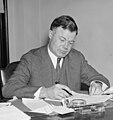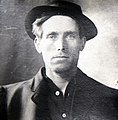Portal:Organized Labour

Introduction

- In trade unions, workers campaign for higher wages, better working conditions and fair treatment from their employers, and through the implementation of labour laws, from their governments. They do this through collective bargaining, sectoral bargaining, and when needed, strike action. In some countries, co-determination gives representatives of workers seats on the board of directors of their employers.
- Political parties representing the interests of workers campaign for labour rights, social security and the welfare state. They are usually called a labour party (in English-speaking countries), a social democratic party (in Germanic and Slavic countries), a socialist party (in Romance countries), or sometimes a workers' party.
- Though historically less prominent, the cooperative movement campaigns to replace capitalist ownership of the economy with worker cooperatives, consumer cooperatives, and other types of cooperative ownership. This is related to the concept of economic democracy.
The labour movement developed as a response to capitalism and the Industrial Revolution of the late 18th and early 19th centuries, at about the same time as socialism. The early goals of the movement were the right to unionise, the right to vote, democracy and the 40-hour week. As these were achieved in many of the advanced economies of western Europe and north America in the early decades of the 20th century, the labour movement expanded to issues of welfare and social insurance, wealth distribution and income distribution, public services like health care and education, social housing and common ownership. (Full article...)
Selected article

Child labour is the exploitation of children through any form of work that interferes with their ability to attend regular school, or is mentally, physically, socially and morally harmful. Such exploitation is prohibited by legislation worldwide, although these laws do not consider all work by children as child labour; exceptions include work by child artists, family duties, supervised training, and some forms of work undertaken by Amish children, as well as by Indigenous children in the Americas.
Child labour has existed to varying extents throughout history. During the 19th and early 20th centuries, many children aged 5–14 from poorer families worked in Western nations and their colonies alike. These children mainly worked in agriculture, home-based assembly operations, factories, mining, and services such as news boys—some worked night shifts lasting 12 hours. With the rise of household income, availability of schools and passage of child labour laws, the incidence rates of child labour fell.
As of 2023[update], in the world's poorest countries, around one in five children are engaged in child labour, the highest number of whom live in sub-saharan Africa, where more than one in four children are so engaged. This represents a decline in child labour over the preceding half decade. In 2017, four African nations (Mali, Benin, Chad and Guinea-Bissau) witnessed over 50 per cent of children aged 5–14 working. Worldwide agriculture is the largest employer of child labour. The vast majority of child labour is found in rural settings and informal urban economies; children are predominantly employed by their parents, rather than factories. Poverty and lack of schools are considered the primary cause of child labour. UNICEF notes that "boys and girls are equally likely to be involved in child labour", but in different roles, girls being substantially more likely to perform unpaid household labour. (Full article...)
December in Labor History
Significant dates in labour history.
- December 01 - W. A. Boyle was born; the Federated Ship Painters and Dockers Union was dissolved
- December 02 - The Professional Footballers' Association was founded
- December 03 - Tom Mooney died
- December 04 - The American Federation of Labor and Congress of Industrial Organizations were dissolved; George L. Berry died; the 2007 South Africa miners' strike occurred
- December 05 - The American Federation of Labor and Congress of Industrial Organizations merged to form the AFL–CIO
- December 06 - Santa Marta massacre occurred in Colombia in 1928; the Bituminous coal strike of 1977–78 began in the U.S.; the Socialist Trade and Labor Alliance was founded
- December 07 - The International Union of Operating Engineers was founded; the Fiji Teachers Union was founded; Vere Bird was born
- December 08 - Federation of Organized Trades and Labor Unions disbanded to from the American Federation of Labor; Anil Moonesinghe died; Bernice Fisher was born
- December 09 - Thomas Hepburn died; the International Federation of Building and Wood Workers was dissolved; Bob Hawke was born; Selig Perlman was born; Pablo Iglesias died
- December 10 - Jean Maitron is born; the American Federation of Teachers won its first collective bargaining election
- December 11 - The Union of Democratic Mineworkers was founded
- December 12 - Ron Carey died; Michael Ratchford died; Anthony Provenzano died; Charles Ballam died; Tommy Lewis was born
- December 13 - Samuel Gompers died; Bernard Kleiman died; William Spence died; the U.S. Supreme Court decided United States v. Wheeler
- December 15 - George Hardy was born; George W. Taylor died; Chico Mendes was born; Mark Hewitson was born; Clinton Jencks died
- December 16 - The Rothbury riot occurred in 1929 in Australia
- December 17 - Clarence Gillis died; Mustafa al-Hallaj died
- December 18 - The Transport and General Workers' Union and Amicus voted to merge into a new union, Unite, in 2006; the Cincinnati Federation of Teachers was formed; the Supreme Court of Canada issued its landmark ruling in RWDSU v. Dolphin Delivery Ltd.; Douglas Fraser was born; Randi Weingarten was born
- December 19 - Frank Keys Foster was born; the Ford Strike of 1945 in Canada ended; B. T. Ranadive was born
- December 20 - The 2005 New York City transit strike began; two of the Sydney Twelve were executed in Australia in 1916; the Supreme Court of Canada issued its landmark ruling in Dunmore v. Ontario (Attorney General); the Occupational Safety and Health Act became law in the U.S. in 1970; Richard Cordtz was born
- December 21 - William Usery Jr. was born
- December 22 - Chico Mendes died; the 2005 New York City transit strike ended
- December 23 - 1929 Australian timber workers' strike began; Gunnar Sträng was born; Derek Simpson was born; Ella Vogelaar was born
- December 24 - Ed Boyce died; the Electrical Trades Union of Australia was formed; Italian Hall Disaster in 1913
- December 25 - Ed Hochuli was born; Bartholomew Ulufa'alu was born; Philip Vera Cruz was born
- December 26 - A series of general strikes began in 1996 in South Korea; Dave Beck died
- December 27 - Cyrus S. Ching died; Free Workers' Union of Germany was founded; William Konyha died; John La Rose was born; Makhan Singh was born
- December 28 - Agnes Nestor died
- December 29 - Flint sit-down strike began in 1936; the Indian Labour Organization was founded; Ted Theodore was born
- December 30 - Bill Tytla died
- December 31 - The International Typographical Union was dissolved; Joseph Yablonski was murdered on the orders of United Mine Workers president W. A. Boyle; John Garden died
More Did you know (auto-generated)
- ... that a 23-day CBC strike thrust Don Goodwin into the Canadian national spotlight and into "folk-hero status"?
- ... that in 1977, Appalachian folk singer Phyllis Boyens performed at a Christmas benefit concert to support Kentucky coal miners who had been on strike for 17 months?
- ... that the 1937 Fleischer Studios strike in New York City was the first major labor strike in the animation industry?
- ... that the 2016 Jim Beam strike was the first labor strike in the company's history?
- ... that Russian pianist Pavel Kushnir died on a hunger strike after his arrest for anti-war videos posted on a YouTube channel with five subscribers?
- ... that Italian anarchists founded the first trade union for bakers in Argentina?
Related Portals
Selected image
Selected Quote
"When people ask me, 'Why can't labor organize the way it did in the thirties?' the answer is simple: everything we did then is now illegal."
|
— Thomas Geoghegan |
Did you know
- ...that although he contributed to an anti-militarist resolution at a congress of the Second International in 1891, Christiaan Cornelissen was one of a few syndicalists to support the Allied effort in World War I in 1914?
- ...that William Dronfield founded the United Kingdom Alliance of Organised Trades, which inspired the creation of the Trades Union Congress?
- ...that in three days of nearly non-stop negotiations, Nathan Feinsinger mediated an end to a 1947 pineapple workers' strike which threatened the entire Hawaiian economy?
Topics
Get involved
Also see our sister WikiProject, Housing and Tenant Rights!
Associated Wikimedia
The following Wikimedia Foundation sister projects provide more on this subject:
-
Commons
Free media repository -
Wikibooks
Free textbooks and manuals -
Wikidata
Free knowledge base -
Wikinews
Free-content news -
Wikiquote
Collection of quotations -
Wikisource
Free-content library -
Wikiversity
Free learning tools -
Wiktionary
Dictionary and thesaurus















































































